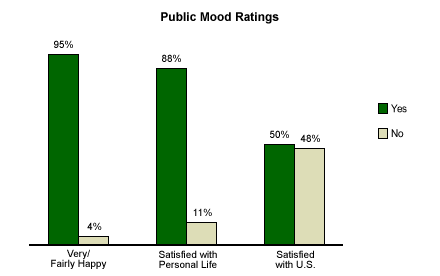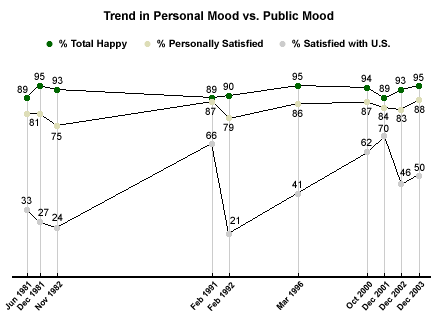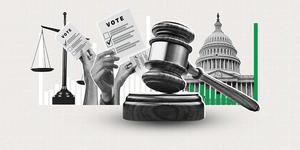As moderator in the Jan. 22 New Hampshire candidate debate, Fox News anchor Brit Hume confused the way Americans feel about their personal lives with the way they feel about the country. He did this in the final question of the debate, posed to Massachusetts Sen. John Kerry.
HUME: Well, let me ask a question to Senator Kerry.
Senator, there was a recent survey, recent poll, found that 95 percent of Americans said they were either very or rather happy.
A news story today said that a key measure of future economic activity -- that being the index of leading economic indicators -- rose in December to its highest level ever. This following a quarter in which the economy grew at a very rapid 8 percent.
Are you concerned at all, sir, that this bleak portrait that those running for president, including yourself, paint of the country may not resemble the country people, by the millions, are experiencing?
In other words, Hume appeared to be asking: Won't the Democratic candidates' "bleak portrait" -- including such things as North Carolina Sen. John Edwards' promises to fight corporate excess, former Vermont Gov. Howard Dean's criticism of the tax code, and Kerry's talk about pollution -- all fall on deaf ears because Americans are "happy?"
The answer: Not necessarily. Personal happiness and political contentment are two distinctly different dimensions of the public's mood. The happiness data that Hume referred to was from a recent December Gallup Poll, and yes, 95% of Americans described themselves as either very happy or fairly happy. Also, 88% said they are satisfied with the way things are going in their personal lives. But in the same December 2003 Gallup survey, only 50% of Americans said they were satisfied with the way things are going in the country. Nearly as many (48%) were dissatisfied.

(More recent figures on U.S. satisfaction are even more negative. According to a Jan. 12-15 Gallup survey*, only 46% of national adults are satisfied with the way things are going in the country; 53% are dissatisfied.)
In other words, that Americans are personally happy does not mean they are content with the goings on in the country around them.
The Trend Is Clear
Gallup has a long history of asking these three questions, and the pattern of results is useful in understanding the different dimensions of mood being rated.
- Most Americans always say they are happy and always say they are satisfied with their personal lives.
- In contrast, public reaction to the state of the nation varies widely, and has never achieved the same levels of satisfaction as are routine for Americans' personal lives and overall happiness.
In the recession of 1982, when only 24% of Americans were satisfied with the way things were going in the country, 75% were satisfied with their personal lives and 93% were happy. And in December 2001, when 70% of Americans were satisfied with the country, 84% were personally satisfied and 89% were happy.
Public satisfaction goes up and down, but personal happiness is relatively constant.

Of the three measures, personal happiness varies the least. In the 10 measures of happiness taken since 1977, the total percent happy has ranged within six points, from 89% to 95%.
Personal satisfaction is also consistently high, but shows slightly more variation. Across 45 readings since 1979, the percentage satisfied with their personal lives has ranged within 15 points, from 73% to 88%.
Across more than 150 readings since 1979, Americans' satisfaction with the state of the nation has ranged within 59 points, from 12% to 71%.
Happiness Less Tied to Politics
While satisfaction with the United States is strongly linked to political views, personal happiness is not. Republicans in December were somewhat more likely than Democrats and independents to say they are "very happy," but in terms of overall happiness, there is little difference. More than 9 in 10 members of all three major partisan groups are happy.
|
|
Republicans |
Independents |
Democrats |
|
Dec. 11-14, 2003 |
|
|
|
|
|
% |
% |
% |
|
Very happy |
62 |
49 |
50 |
|
Fairly happy |
35 |
47 |
41 |
|
Not too happy |
3 |
4 |
7 |
|
|
|
|
|
|
Total happy |
97 |
96 |
91 |
By contrast, the public's perception of the state of the nation is highly partisan, based largely on the political party of the sitting president. With a Republican president in the White House, it is not surprising that three-quarters of Republicans surveyed in December were satisfied with the way things are going in the United States; three-quarters of Democrats and half of independents were dissatisfied. (The opposite pattern was the case during the Clinton years; Democrats were more satisfied with the way things were going in the country than were Republicans.)
|
|
Republicans |
Independents |
Democrats |
|
Dec. 11-14, 2003 |
|
|
|
|
|
% |
% |
% |
|
Satisfied |
75 |
45 |
23 |
|
Dissatisfied |
24 |
52 |
76 |
|
No opinion |
1 |
3 |
1 |
Happiness appears to be a universal emotion. Ratings of the nation's well-being are political.
Then, there is the litany of public attitudes about specific aspects of the nation that one could review. In January, Gallup recorded Americans' satisfaction with 28 issues facing the country. On less than half of these (13), Americans were more satisfied than dissatisfied. Americans were more dissatisfied than satisfied on such issues as the economy, taxes, healthcare, immigration, public education, and corporate influence. And despite a tremendous improvement in economic growth and the stock market over the past year, Americans' ratings of the economy are still tepid. Only 37% in mid-January rated it excellent or good, while 63% called it only fair or poor.
So, while Americans are broadly satisfied with some aspects of the country -- particularly areas related to foreign policy and the ability of people to achieve the "American Dream" -- they are looking for solutions in many other areas, and may therefore be receptive to the messages that Kerry and the other Democrats are delivering.
Bottom Line
In framing his re-election campaign, President George W. Bush and his advisers will need to face squarely the public's somewhat prickly mood, and make the distinction between Americans' personal frames of mind and their political frames of reference. To do otherwise, and believe that the Democratic candidates are just whistling into the wind with their harsh critiques of the country, would be folly.
*These results are based on telephone interviews with a randomly selected national sample of 1,004 adults, aged 18 and older, conducted Jan. 12-15, 2004. For results based on this sample, one can say with 95% confidence that the maximum error attributable to sampling and other random effects is ±3 percentage points. In addition to sampling error, question wording and practical difficulties in conducting surveys can introduce error or bias into the findings of public opinion polls.
